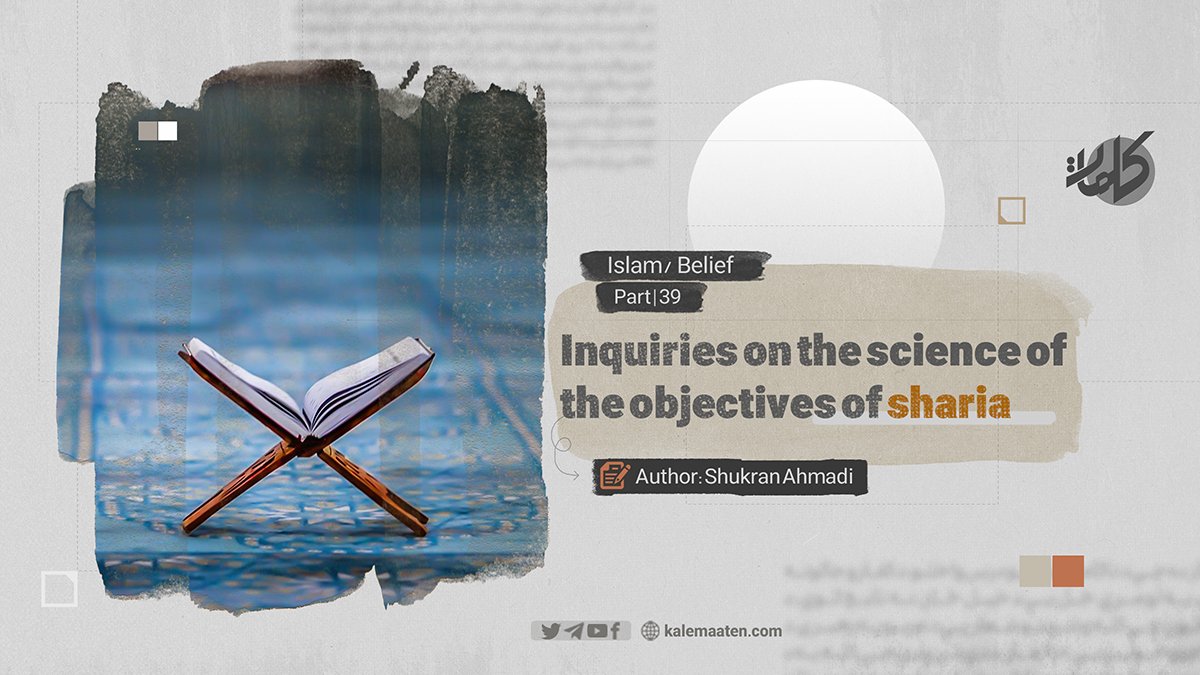Author: Shukran Ahmadi
Inquiries on the Science of the Objectives of Sharia (Part 39)
2. Negative Means in Preserving the Soul
B) The Prohibition of Suicide and Self-Harm in Islam
One of the important methods of protecting human life in Islam is the prohibition of suicide. Allah Almighty states in the Holy Quran: وَلَا تُلْقُوا بِأَيْدِيكُمْ إِلَى التَّهْلُكَةِ. Translation: “Do not throw yourselves into destruction with your own hands.” He also states in another verse: وَلَا تَقْتُلُوا أَنْفُسَكُمْ إِنَّ اللَّهَ كَانَ بِكُمْ رَحِيمًا. Translation: “Do not kill yourselves; indeed, Allah is Most Merciful to you.”
In a hadith narrated by Bukhari and Muslim on the authority of Abu Huraira, the Prophet, (PBUH), says: “Whoever throws himself off a mountain and commits suicide will fall into the fire of Hell forever. Whoever commits suicide by drinking poison will forever hold the poison in his hand in Hell, drinking it sip by sip; and whoever commits suicide with an iron will forever hold the iron in his hand in Hell, sinking it into his belly.”
This hadith clearly states that killing oneself, even if primarily motivated by personal anguish, is forbidden, and the perpetrator will be held accountable by Allah. Bukhari narrated from Abu Huraira (MAPH) that the Prophet (PBUH) said: “Whoever strangles himself will strangle himself in the Fire, and whoever stabs himself with a spear will stab himself in the Fire.”
Jundab bin Abdullah, may Allah be pleased with him, also narrated that the Prophet, may Allah bless him and grant him peace, said: “A man from the past who was wounded, unable to bear the pain, took a knife and cut his hand. His blood did not stop until he died. Allah Almighty said: ‘My servant has surpassed Me, so I have forbidden Paradise for him.'”
C) The Legitimacy of Qisas (Retaliation) in Islam
Another means of protecting human life is the legitimacy of retaliation. Islamic law has established retaliation as a just punishment for intentional murder. This ruling has both a deterrent effect for society and a punitive effect for the individual offender. Allah Almighty says in the Holy Quran: وَلَكُمْ فِي الْقِصَاصِ حَيَاةٌ يَاأُولِي الْأَلْبَابِ لَعَلَّكُمْ تَتَّقُونَ. Translation: “And there is life in retaliation for you, O people of intellect, that you may become righteous.”
This verse shows that retaliation is legislated not only for revenge but also for the preservation of life and the prevention of chaos in society.
Islamic law fully respects justice in the implementation of retribution. All human beings, regardless of gender, age, or social status, are equal before the law of retribution. Allah Almighty says in the Quran: النَّفْسَ بِالنَّفْسِ. Translation: “A soul for a soul.”
Even in cases of accidental killing, Islamic law requires responsibility and payment of blood money. Allah Almighty says: وَمَنْ قَتَلَ مُؤْمِنًا خَطَأً فَتَحْرِيرُ رَقَبَةٍ مُؤْمِنَةٍ وَدِيَةٌ مُسَلَّمَةٌ إِلَى أَهْلِهِ إِلَّا أَنْ يَصَّدَّقُوا. Translation: “Whoever kills a believer by mistake must free a believing slave and pay blood money to the family of the deceased, unless they forgo the blood money.”
Islamic law, by establishing precise and comprehensive rules, provides a foundation for the creation and preservation of human life while blocking pathways to transgress against souls. On one hand, it condemns suicide and self-immolation as significant and unforgivable sins; on the other, by legislating retribution and blood money, it presents a just system for protecting human lives.
References
1. Holy Quran.
2. Al-Bukhari, Muhammad bin Ismail Abu Abdullah (1987). Sahih Al-Bukhari. Verified by Dr. Mustafa Dib Al-Baghaa. Beirut: Dar Ibn Kathir.
3. Ibn Ashour Al-Tunisi, Muhammad Al-Tahir bin Muhammad bin Muhammad Al-Tahir (2004). The Objectives of Islamic Law. Verified by Muhammad Al-Habib bin Al-Khoja. Qatar: Ministry of Endowments and Islamic Affairs.
4. Al-Raysuni, Ahmad (1992). The Theory of Objectives according to Imam Al-Shatibi. International House of Islamic Book.
5. Al-Razi, Ahmad bin Faris bin Zakariya Al-Qazwin, Abu Al-Hussein (1979). Dictionary of Language Standards. Verified by Abdul Salam, Muhammad Harun. Beirut: Dar Al-Fikr.
6. Al-Shatibi, Ibrahim bin Musa bin Muhammad Al-Lakhmi Al-Gharnati. Al-Muwafeqat fi Usul Al-Sharia. Investigator: Abu Ubaidah Mashhur bin Hassan Al Salman. Dar Ibn Affan.
7. Al-Qushayri, Abu Al-Hussein Muslim bin Al-Hajjaj (Al-Naysaburi 133 AH). Sahih Muslim. Beirut: Dar Al-Jeel.
8. Al-Yubi, Muhammad Saad bin Ahmad bin Masoud. The Objectives of Islamic Sharia and Its Relationship to Legal Evidence. Riyadh: Dar Al-Hijr for Publishing and Distribution.
9. Zarkashi, Badr Al-Din, Muhammad bin Bahadur. Al-Bahr Al-Muheet fi Usul Al-Fiqh. Beirut: Dar Al-Kutub Al-Ilmiyyah.
10. Al-Ghazali, Abu Hamid, Muhammad bin Muhammad. Al-Mustasfi fi Ilm Usul Al-Fiqh. Beirut: Al-Risala Foundation.
11. Ibn Qayyim Jawziyah, Muhammad bin Abi Bakr. Shifa’ al-Albil fi Issues of Predestination, Wisdom and Reasoning. Beirut: Dar al-Ma’rifa.
12. Amidi, Abu al-Hasan Sayyid al-Din, Ali bin Abi, Ali bin Muhammad. Ghayat al-Maram. Publisher: The Supreme Council for Islamic Affairs.
13. Fakhr al-Din al-Razi, Abu Abdullah, Muhammad bin Omar al-Razi. Mafatih al-Ghayb = The Great Interpretation. Musassah al-Risala.
14. Ibn Hazm, Abu Muhammad Ali bin Hazm Andalusi Zahiri. Al-Ahkam fi Usul Al-Ahkam. Beirut: Dar Al-Jeel.
15. Ibn Qayyim JawziyYah, Muhammad bin Abi Bakr. The Key to the House of Happiness and the Publication of the Guardianship of Knowledge and Will. Cairo: Dar Al-Hadith.
16. Muhammad Mustafa Zuhayli (2006). Al-Wajeez in the Principles of Islamic Jurisprudence. Damascus: Dar Al-Khair for Printing, Publishing and Distribution.
17. Abu Dawood, Sulayman bin Al-Ash’ath Al-Sijistani. Sunan Abi Dawood. Beirut: Modern Library, Saida.
18. Al-Najdi, Sami’. The Importance of the Objectives of Islamic Law. Beirut: Dar Al-Kutub Al-Ilmiyyah.



